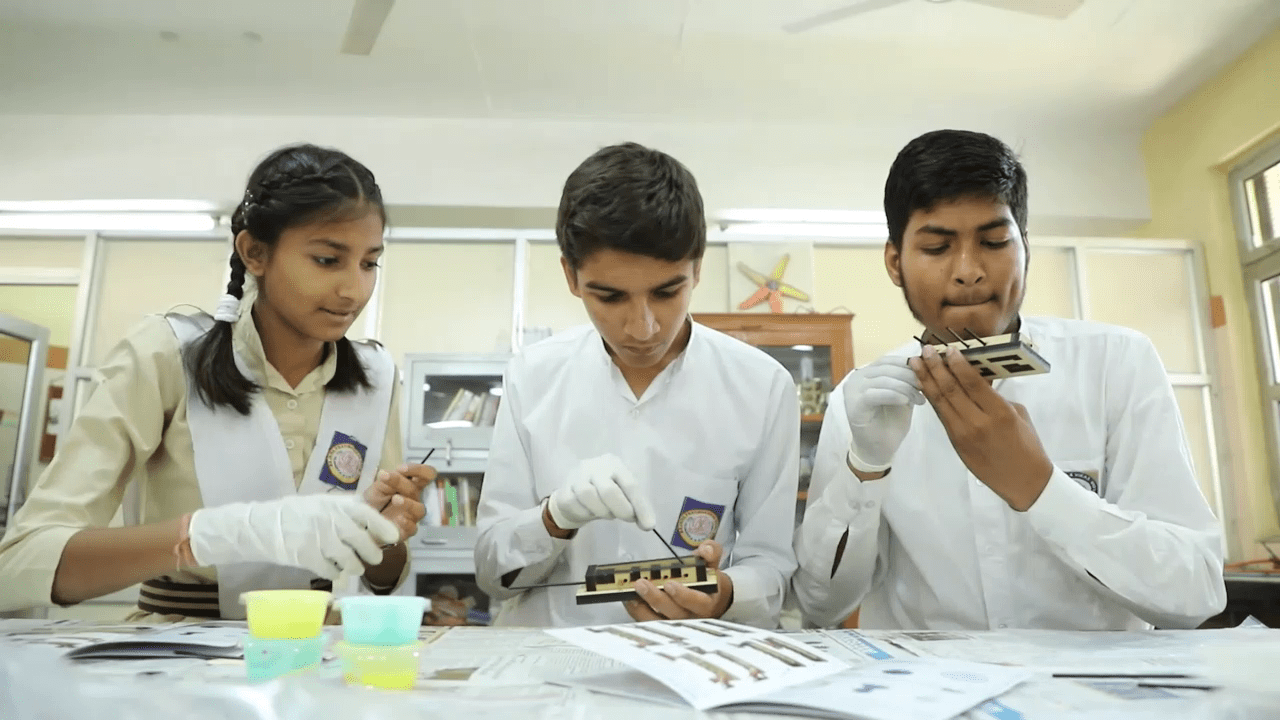Soft Robotics Toolkit
Year-wise Progress
Year 1: In its first year, the project tackled the challenge of adapting the content of the kit to various levels of education and address the inequities related to education delivery as well as barriers in language and priority levels placed on STEM programs over other subjects. In March 2019, the team collaborated with Shiv Nadar Schools and Rajkiya Pratibha Vikas Vidyalaya Schools to test the toolkits in the form of workshops, which was successful in fostering an understanding of the age groups the toolkit can target. Data gathered from these workshops was utilized to refine the toolkit and instruction materials for the next round of development. In addition to redesigning a few components, the mode of instruction was shifted from photos-based instructions to rendered graphic instructions to minimize confusion among students and the instructions were modified for clarity and to promote intuitive learning.

Year 2: The team conducted two workshops in October 2019 in New Delhi. One was with a private school, Prakriti, and the other was a public government school. The workshops were met with positive feedback from both faculty and students and important insights were gathered for further development of the product. Through the response from these workshops, the team recognized the challenge of introducing a novel topic like soft robotics to Indian classrooms, and developed a two-part online workshop for teachers that includes a total of thirteen lessons to be completed over a period of six weeks. Participation in these online workshops equipped teachers with the right knowledge and tools to facilitate lessons in soft robotics.
Year 3: In 2020, the project tested its digital version through a school teacher in Pune who was provided with the curriculum. Under the guidance of this teacher, using the curriculum design and kit, the students built and learned about soft robotics during a four-day workshop. The project team, during their visit to India in January 2020, met with potential collaborators to discuss low-scale production of the kits. Additionally, in January 2020, the team showcased the complete kit to students, educators, and parents at the India Science Festival in IISER, Pune.
Against the background of the ongoing pandemic and the implications it poses toward the future of classroom education, the project has adapted and redesigned its curriculum and teaching modules to adapt to the digital medium, such as Google Classroom, and each module comes with a video preview.
Among the changes in the curriculum, the most significant is the introduction of a second kit to the program. In addition to the core kit that will introduce students to soft robotics and explain how to build the gripper, the extension kit will allow them to build their own soft gripper. This would encourage students to make their own prototype designs, test and iterate their designs, and finally reflect on their design process and learning from it. Additionally, the gripper was redesigned to make it longer than the previous version. With the longer gripper, students would be able to attempt a greater variety of tasks and understand the functional uses of it.
The project arrived at a point to move on to alpha phase prototyping with the help of Design Alpha who provided services such as design for manufacturing, sourcing parts and materials, manufacturing custom parts, instruction manual design, and packaging. The project produced 120 kits for a virtual pilot study involving 6 schools in New Delhi, Pune, and Bihar, deploying 72 kits with 60 students and led by 12 of the school educators. At the beginning of this, our team conducted a two-week-long, online professional development workshop to prepare the educators. The focus of these workshops was to test the adaptability to a digital medium and bolster student autonomy. Additionally, it aimed to test whether the toolkits influence students’ engineering identity, interest, and confidence and equip students to solve a problem using soft robotics.
The project had an end-of-pilot celebration in June to showcase student work and present awards. The attendees included people involved in supporting our efforts and in particular, individuals from the ATAL Innovation Mission who helped find the schools we worked with and the team hopes to continue a relationship with them and deploy our kits into more schools in their network.
